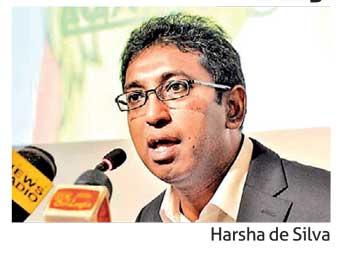27 Jul 2023 - {{hitsCtrl.values.hits}}
 During a recent press conference, Samagi Jana Balawegaya MP Harsha de Silva addressed the critical issues hindering Sri Lanka’s economic progress and outlined a vision for sustainable growth through a social market economy model.
During a recent press conference, Samagi Jana Balawegaya MP Harsha de Silva addressed the critical issues hindering Sri Lanka’s economic progress and outlined a vision for sustainable growth through a social market economy model.
The press conference shed light on several factors contributing to the country’s economic challenges and proposed solutions to pave the way for a prosperous future.
One of the key concerns raised was the significant disparity between Tamil Nadu’s projected growth of 14 percent and Sri Lanka’s negative 3.5 percent growth. De Silva emphasised the need to understand the obstacles preventing Sri Lanka from achieving higher growth rates,
especially if the country is to attain its goal of becoming a high-income nation by 2048.
To realise the ambitious goal of high-income status, Sri Lanka must grow at a minimum of 6.5 percent annually until 2048, he pointed out. De Silva questioned the feasibility of a production-based economy and emphasised the importance of identifying the right high-tech products or components and target markets to stimulate demand.
De Silva acknowledged the presence of over 800 higher education institutes in India, particularly in Tamil Nadu and their role in nurturing skilled labour. However, he also noted that the volume of skilled labour produced in India far exceeds Sri Lanka’s output, which raises significant questions about the country’s ability to compete effectively on the
international stage.
To achieve sustainable economic growth and development, Sri Lanka must address the disparity in skilled labour and invest in educational reforms to bridge the gap,
he noted.
De Silva also stressed the utmost significance of engaging in bilateral and regional trade agreements, which would facilitate the free flow of goods and further promote international trade for Sri Lanka.
Emphasising the need to embrace technological advancements in production, he pointed out the immense potential for exports,
especially in sectors such as electronic vehicles, auto components and telecommunications equipment, where Tamil Nadu in India has already established a strong presence.
De Silva called for a fundamental shift in the country’s mindset and highlighted the necessity of a social market economy model to achieve social and economic justice. He underscored the importance of transparency and avoidance of false promises, urging a focus on the core issues.
De Silva rejected the notion that building bridges with India would be disadvantageous to Sri Lanka and pointed to the opportunities arising from South India’s rapid growth. He cited Tamil Nadu’s success in becoming the ‘Detroit of Asia’ and highlighted the potential for energy export from Mannar to India, similar to Bhutan’s hydro-dam exports.
especially in sectors such as electronic vehicles, auto components and telecommunications equipment, where Tamil Nadu in India has already established a strong presence. De Silva called for a fundamental shift in the country’s mindset and highlighted the necessity of a social market economy model to achieve social and economic justice. He underscored the importance of transparency and avoidance of false promises, urging a focus on the core issues. De Silva rejected the notion that building bridges with India would be disadvantageous to Sri Lanka and pointed to the opportunities arising from South India’s rapid growth. He cited Tamil Nadu’s success in becoming the ‘Detroit of Asia’ and highlighted the potential for energy export from Mannar to India, similar to Bhutan’s hydro-dam exports.
31 Oct 2024 1 hours ago
31 Oct 2024 2 hours ago
31 Oct 2024 3 hours ago
31 Oct 2024 3 hours ago
31 Oct 2024 3 hours ago